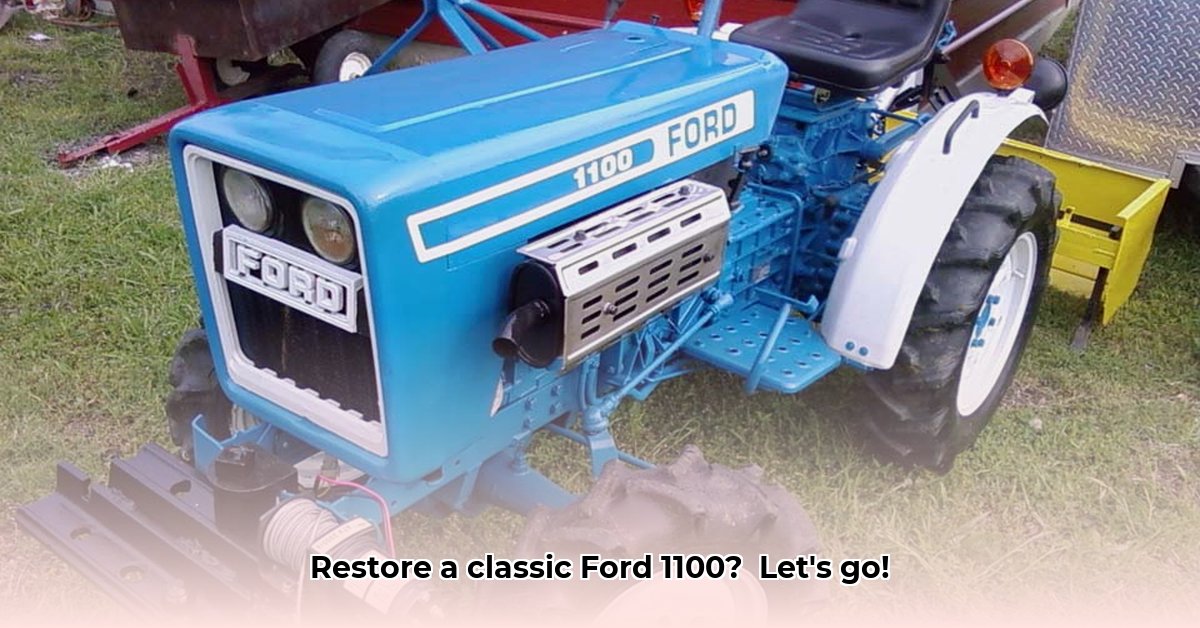
1100 Ford Tractor: A Compact Powerhouse's Legacy
The Ford 1100 tractor, a compact powerhouse from a bygone era, offers a unique blend of vintage charm and surprising capabilities. Produced by Shibaura for Ford from 1979 to 1983, this little tractor wasn't just a pretty face; it was a reliable workhorse for smaller farms and properties, proving that size isn't everything. Its efficient design and surprising versatility make it a fascinating piece of agricultural history and a rewarding project for collectors. But how much do you really know about this iconic machine? For more information on larger Ford tractors, check out Ford Tractor Specs.
Technical Specifications & Historical Overview
This compact tractor boasts a 0.7-liter, two-cylinder diesel engine, delivering approximately 12.5 to 13 horsepower (9.3-9.7 kW). Don't underestimate this modest power output; coupled with a 10 forward and 2 reverse gear transmission, it offered impressive maneuverability. Its adaptability is truly remarkable. A wide range of attachments—mowers, snowblowers, front-end loaders, and backhoes (optional)—transformed this machine into a versatile tool for various tasks. This nimble design showcases clever engineering from a bygone era.
Here's a summary of its key specifications:
| Specification | Details |
|---|---|
| Engine | Shibaura 0.7L, 2-cylinder diesel |
| Horsepower | Approximately 12.5 - 13 hp (9.3-9.7 kW) |
| Transmission | 10 forward gears, 2 reverse gears |
| Attachments | Mower deck, snowblower, front-end loader, backhoe (optional) |
| Production Years | 1979-1983 |
While precise sales figures are elusive, its enduring popularity among collectors speaks volumes about its quality and appeal. The Ford 1100 occupied a unique niche in Ford's tractor lineup, appealing to those needing a compact yet powerful machine. It stood as a testament to efficient design and remarkable versatility.
Maintenance and Repair Guide: Keeping Your 1100 Running
Owning a vintage tractor is rewarding, but requires diligent maintenance. Regular upkeep keeps your 1100 running smoothly for years. Think of it as investing in a piece of history.
Essential Preventative Maintenance:
- Oil Changes: Follow the manufacturer's recommended intervals. Using the correct oil type is crucial (check your owner's manual).
- Filter Replacements: Regularly replace air, fuel, and oil filters. Clean filters ensure optimal engine performance.
- Fluid Level Checks: Regularly check coolant, transmission fluid, and hydraulic fluid levels. Low fluids indicate potential issues.
- Lubrication: Lubricate all grease points. This prevents wear and tear, extending the life of your tractor.
Troubleshooting Common Problems:
- Starting Issues: Check the battery, fuel supply, and glow plugs (if equipped). Simple fixes often resolve startup problems.
- Engine Noises: Investigate potential fuel delivery issues or check for leaks. Unusual noises often indicate underlying issues.
- Hydraulic Problems: Inspect fluid levels, hoses, and connections for leaks or damage. A damaged hose can quickly escalate into a major problem.
Parts Sourcing: Finding parts for a vintage tractor can be challenging. Online forums dedicated to vintage Ford tractors, specialist tractor parts suppliers, and even local salvage yards can provide sources. Persistence pays off!
Collector's Interest and Market Value
The Ford 1100's compact size, distinctive styling, and relative rarity make it highly desirable among collectors. The value varies significantly based on condition; a fully restored model commands a higher price than one requiring extensive work. Joining online collector communities offers invaluable insights into restoration projects and market trends. What factors influence the value of a meticulously restored Ford 1100?
Pros & Cons: The 1100 Decision
Before purchasing, consider these advantages and disadvantages:
Pros:
- Compact size and maneuverability.
- Customization and restoration potential.
- Historical significance and collector value.
- Relatively simple mechanical design.
Cons:
- Limited parts availability.
- Requires specialized maintenance knowledge.
- Lower horsepower than modern tractors.
Conclusion: The Enduring Legacy of the Ford 1100
The Ford 1100 tractor's blend of compact power, versatility, and historical significance ensures its enduring appeal. While parts sourcing and maintenance present unique challenges, the rewards of owning and restoring this classic machine are undeniable. The effort invested yields a tangible connection to agricultural history and a machine that continues to impress. Is this compact powerhouse your next restoration project?